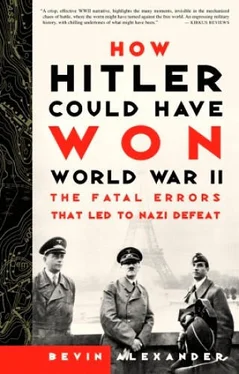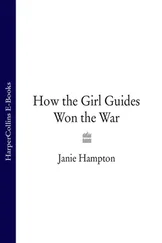Chapter 9: Falling Between Two Stools
p. 92: “and achieved air supremacy.” Arguments that the Balkan campaign caused a fatal delay of six weeks in attacking Russia are incorrect. The campaign could not have commenced any earlier. Spring 1941 was exceptionally wet. The Bug River and its tributaries were still in flood stage well into May, and the ground nearby was swampy and almost impassable. See Fuller, vol. 3, 420; Guderian, 145.
p. 93: “submission in a week.” Only a day after the Germans invaded, Joseph Stalin caused the Supreme Soviet to establish the State Defense Committee, or GKO, with himself as chairman, with a Supreme Command, or Stavka, which he also dominated, placed under the GKO.
p. 93: “‘blinded us for a few moments,’ Guderian wrote.” Guderian, 156.
p. 94: “‘obedience and endurance.’” Liddell Hart, Second World War, 162.
p. 94: “something that shortly did happen.” On July 27, troops were read an order sentencing nine senior officers to death for being defeated. Others were shot in secret or committed suicide rather than face executioners. “Special sections” of the NKVD were deployed behind the lines to shoot deserters. On July 16 Stalin restored the “dual authority” of the political commissars—meaning once more they could overrule decisions of commanders.
p. 94: “‘by an order of an officer.’” Bartov, Hitler’s Army, 86.
p. 97: “‘an attack toward Moscow.’” Guderian, 190.
p. 97: “Ukraine and Crimea.” Ibid., 198–200.
p. 98: “Rasputitsa (literally ‘time without roads’).” Glantz and House, 80.
Chapter 10: Failure Before Moscow
p. 101: “‘unbounded determination to win.’” Kimball, 92.
p. 102: “first meeting of the two leaders.” At Placentia, FDR and Churchill agreed to the “Atlantic Charter,” which reflected American ideals. It included Roosevelt’s “Four Freedoms”: freedom from want and fear, and freedom of worship and speech. Plans for a postwar international system remained vague. The charter called for “self-determination” of peoples to choose their form of government, but it didn’t condemn colonies of the imperialist powers or Stalin’s claims in eastern Europe. The charter also referred to “economic liberalism,” calling for equal access for all to trade and raw materials, thus implicitly opposing closed trading blocs, including Britain’s empire preference in commerce. See Kimball, 99–101, 205–6; Zabecki, vol. 1, 15–16 (Spencer Tucker).
p. 102: “convoys to Iceland.” Britain had occupied Iceland on May 10, 1940. The United States took over protection of the island in April 1941 and sent in troops to guard it in July 1941.
p. 103: “request by generals for retirement.” Goerlitz, 402–4.
p. 104: “clothing turning into rags.” Keegan, Second World War, 198–99.
p. 105: “‘the situation was reversed.’” Guderian, 237.
pp. 105–106: “‘great wear to the engines.’” Ibid., 233–34.
p. 107: “with no loss to themselves.” Glantz and House, 87.
p. 109: “‘very difficult to get out of.’” Mellenthin, 153.
Chapter 11: To and Fro in the Desert
p. 110: “‘carried there at all costs.’” Churchill, Second World War, The Grand Alliance, 246.
p. 111: “‘tearing my tanks to bits.’” Liddell Hart, Second World War, 179.
p. 112: “never be allowed to reorganize.” Rommel, 198–200.
p. 115: “conditions favorable to the British.” Liddell Hart, The Tanks, vol. 2, 103.
p. 115: “‘smash them in detail?’” Ibid.
Chapter 12: No Change in Strategy
p. 126: “supplies from America.” Dahms, 342–43.
p. 126: “oil fields of Iraq and Iran.” Rommel wrote that “in the summer of 1942, given six German mechanized divisions, we could have smashed the British so thoroughly that the threat from the south [Mediterranean] would have been eliminated for a long time to come. There is no doubt that adequate supplies for these formations could have been organized if the will had been there.” See Rommel, 192.
p. 129: “won the Battle of the Atlantic.” Dahms, 344–45.
p. 129: “the Caucasus oil fields and Murmansk.” Ibid., 342.
p. 130: “‘clear away the problems involved.’” Rommel, 191–92.
Chapter 13: The Drive to El Alamein
p. 131: “but he was turned down.” Rommel, 203.
p. 132: “nearly won a total victory.” On January 22, 1942, Hitler designated Rommel’s force as Panzer Army Africa. In addition to Africa Corps (21st and 15th Panzer Divisions) and 90th Light Division, it included the Italian 20th Corps (Ariete Armored Division and Trieste Motorized Division), 21st Corps (Pavia, Trento, and Sabratha Infantry Divisions), and 10th Corps (Bologna and Brescia Infantry Divisions). Later the Italians committed another armored division, the Littorio. Only it and 20th Corps were motorized, and hence of any use in mobile warfare. The others had little organic transportation. See Ibid., 181, 195, 198.
p. 132: “moved 2nd Air Corps back to Russia.” Ibid., 203fn; Dahms, 357.
p. 134: “be conducted offensively.” Rommel, 194.
p. 134: “‘decided to strike first.’” Ibid., 193–94.
p. 136: “‘far as the eye could see.’” Lucas, 98–99.
p. 137: “‘to wherever danger threatened.’” Rommel, 208.
p. 138: “‘and use up their strength’” Ibid., 211.
p. 139: “‘strength at the decisive point?’” Ibid., 217.
p. 141: “‘given me one more division.’” Ibid., 232.
p. 146: “and surrounded 6th Army.” Stalingrad’s main significance was to block oil from the Caucasus that Stalin had to have to stay in the war. Barge traffic from the Caspian to the Volga and northward became the main route for oil after the Germans broke the oil pipeline from the Caucasus at Rostov on July 23. Gunfire on the river was as effective in blocking barge passage as possession of Stalingrad itself. The Russians hurriedly laid a railway line west of the Caspian Sea from the oil fields at Baku to Astrakhan on the Volga. They also built a new rail line in the steppe from Astrakhan to Saratov, 250 miles northeast of Stalingrad, bypassing the city. In addition, the Russians sent 1,300 trucks a day over roads east of the Volga. When Averell Harriman asked Stalin if Russia needed more tanks, he answered that he’d rather have trucks. See Shirer, 909; Liddell Hart, Second World War, 247; Dahms, 370.
p. 147: “Baltic to the Black Sea.” The army had suffered over a million casualties and received 800,000 replacements, but required 200,000 men to police the million square miles of Soviet territory Germany had occupied. See Das Deutsche Reich und der Zweite Weltkrieg, vol. 6, 778–85, 911–26. See also Theo J. Schulte, The German Army and Nazi Policies in Occupied Russia (Oxford, New York: Oxford University Press, 1989).
p. 147: “Halder wrote in his diary.” Liddell Hart, The Other Side of the Hill, 296–98.
p. 147: “forces that had been surrounded.” The German army survived the winter of 1941–1942 by holding key urban areas as bastions—Schlüsselburg, Novgorod, Rzhev, Vyasma, Briansk, Orel, Kursk, Kharkov, and Taganrog. Russians advancing around them could be cut off by flanking strokes from the strongholds. The German term for this process was einigeln, or to curl forces into a ball as der Igel, the hedgehog, does when it is threatened.
p. 149: “under Fedor von Bock.” Walther von Reichenau had replaced Gerd von Rundstedt as army group commander, but he died of a heart attack in January 1942.
Читать дальше


![Джонатан Димблби - Barbarossa - How Hitler Lost the War [calibre]](/books/385421/dzhonatan-dimblbi-barbarossa-how-hitler-lost-the-w-thumb.webp)









